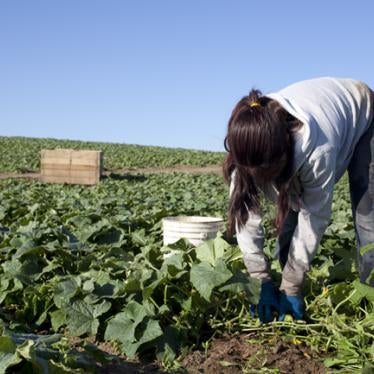South Dakota must stop subjecting children to inhumane treatment in detention, Human Rights Watch urged in a letter to South Dakota Governor William Janklow.
Since the death of a fourteen-year-old girl at the state boot camp for girls last year, a growing number of youth and their parents have come forward with accounts of egregious human rights abuses in South Dakota's juvenile detention facilities. These accounts charge that guards shackle youth in spread-eagled fashion after cutting their clothes off (a practice known as "four-pointing"), chain youth inside their cells ("bumpering"), and place children in isolation twenty-three hours a day for extended periods of time. Girls held in the State Training School report that they have been strip-searched by male guards, sprayed with pepper spray while naked, and handcuffed spread-eagled to their beds.
"These reports are shocking," said Bochenek. "It's appalling to think of guards cutting the clothes off of children, shackling them naked to their beds, or chaining them to their doors. Americans criticize other societies that treat children in this way. They should not allow these kinds of practices to take place in their own country."
Many of the children in these facilities have been detained for minor offenses such as shoplifting. Others are locked up for "status offenses," meaning acts such as truancy or running away from home that would not be crimes if committed by an adult.
The federal Juvenile Justice and Delinquency Prevention Act, enacted in 1974, requires states to remove all status offenders from juvenile detention and correctional facilities. South Dakota is one of only three states that do not comply with this federal mandate.
Ten days ago the Youth Law Center, based in San Francisco, and Washington, DC, filed a class-action lawsuit against the South Dakota Department of Corrections. In addition to charging the department with abusive disciplinary practices and excessive use of force, the suit alleges that detained youth are subjected to inadequate medical and mental health care, deficient education, and other abusive conditions of confinement.
Reports of abuses in South Dakota's juvenile detention facilities became an issue in July 1999, when Gina Score died after collapsing during a forced run at the state's boot camp for girls. According to the state investigators' report, she frothed at the mouth after she collapsed, lost control of her bladder, progressively lost her ability to communicate, and eventually became completely unresponsive. Boot camp staff refused to allow other youth to shield her from the sun, telling them that they should not make things "easy" or "comfortable" for her.
Staff left her where she fell for over three hours. When they finally took her to the hospital, her body temperature measured 108 degrees, the highest temperature the thermometer could record. Doctors pronounced her dead an hour later.
Human Rights Watch called on Governor Janklow to end the use of "four-pointing" and "bumpering," prohibit the use of solitary confinement, and end routine strip-searches of girls by male guards. Following international standards, physical restraint and the use of force should only be used after all other control methods have been exhausted and failed. Methods of restraint should never cause humiliation or degradation. Children should never be subjected to closed or solitary confinement or any other punishment that may compromise their physical or mental health.
"Children should not have to go to federal court to get the state to respect their rights," said Bochenek. "The state can and should implement these changes now."
The organization also called on the governor to change juvenile sentencing guidelines that permit status offenders to be locked up and allow for open-ended sentences that can result in youth remaining in detention until they reach the age of twenty-one.








